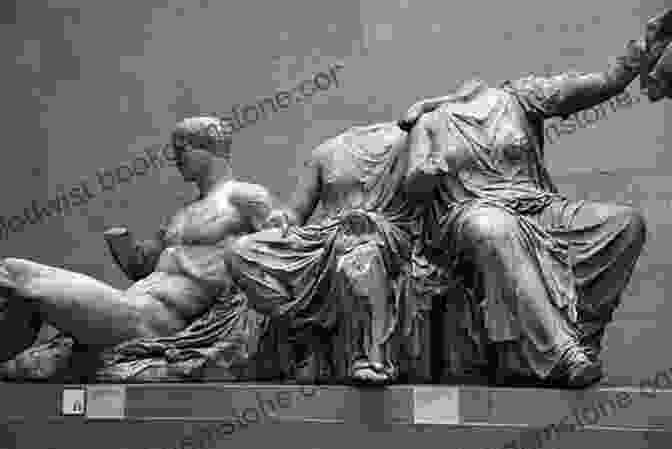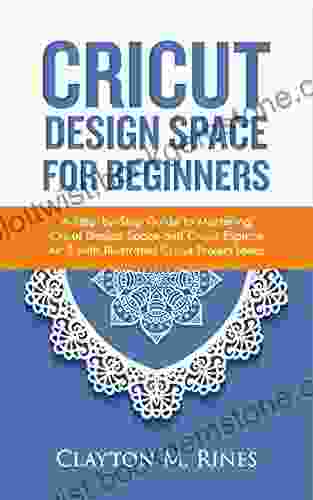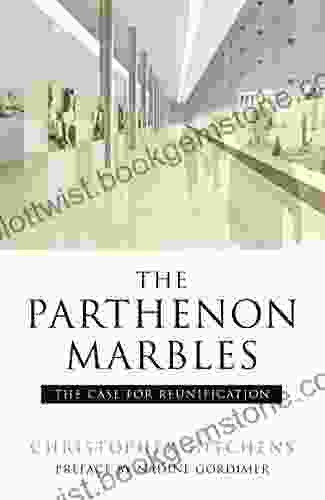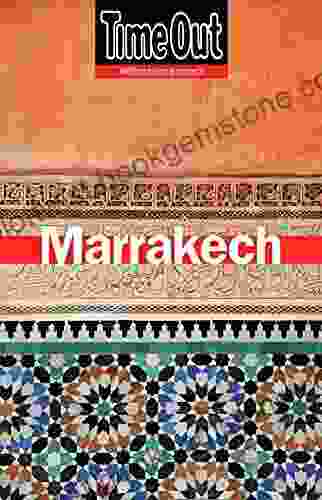The Parthenon Marbles: The Case for Reunification

: The Heart of a Controversial Debate

4.4 out of 5
| Language | : | English |
| File size | : | 1494 KB |
| Text-to-Speech | : | Enabled |
| Screen Reader | : | Supported |
| Enhanced typesetting | : | Enabled |
| Word Wise | : | Enabled |
| Print length | : | 191 pages |
The Parthenon Marbles, also known as the Elgin Marbles, have been at the center of a protracted and contentious debate regarding their rightful ownership and display. These magnificent marble sculptures, once adorning the iconic Parthenon temple on the Acropolis of Athens, were removed by Lord Elgin in the early 19th century and have since resided in the British Museum in London. The question of whether the Marbles should be returned to Greece has sparked passionate arguments, evoking strong emotions and posing complex historical, cultural, legal, and ethical questions.
Historical Context: Acquisition and Controversy
In 1801, Lord Elgin, the British ambassador to the Ottoman Empire, obtained a firman (a permit) from the Ottoman authorities to remove sculptures from the Parthenon. Over the course of several years, Elgin's agents dismantled and transported numerous marble sculptures, metopes, and pedimental figures to England, where they were eventually acquired by the British Museum in 1816.
The removal of the Marbles provoked immediate condemnation from many Greeks, who saw it as an act of cultural plunder. The Greek government has consistently demanded the return of the sculptures, arguing that they are an integral part of Greece's national heritage and that their removal was illegal.
Arguments for Reunification: Cultural Heritage and Historical Context
Proponents of reunification argue that the Parthenon Marbles belong in Greece, their original home. They emphasize the cultural and historical significance of the sculptures, which are inextricably linked to the Parthenon and the Acropolis. The Marbles, they assert, are not merely individual works of art but are part of a larger architectural and artistic ensemble that has profound symbolic and cultural meaning for Greece.
Furthermore, they contend that the removal of the Marbles was an act of cultural imperialism, perpetrated during a period when Greece was under foreign occupation. They argue that the sculptures were taken without Greece's consent and that their return is a matter of historical justice and cultural restitution.
![]()
Arguments against Reunification: Preservation and Accessibility
Opponents of reunification maintain that the Parthenon Marbles are best preserved and displayed in the British Museum. They argue that the Museum has the expertise and resources to ensure the sculptures' conservation and that its extensive collection provides a unique opportunity for public access and education.
They also contend that the Marbles have become an integral part of British culture and heritage, having been on display in London for over two centuries. They argue that their removal would deprive the British public and international visitors of the opportunity to appreciate these iconic works of art.
International Perspectives and UNESCO's Role
The debate over the Parthenon Marbles has captured international attention, with many countries and organizations weighing in on the issue. UNESCO, the United Nations Educational, Scientific and Cultural Organization, has played a significant role in the discussions, advocating for the protection and preservation of cultural heritage.
In 1982, UNESCO adopted a resolution calling for the return of cultural property to its country of origin. This resolution, while not legally binding, has served as a guiding principle in international discussions on cultural heritage repatriation.
The Path Forward: Complexities and Diplomacy
The debate over the Parthenon Marbles is a complex and multifaceted issue, with strong arguments on both sides. The question of whether the sculptures should be returned to Greece or remain in the British Museum is ultimately a matter of balancing historical, cultural, legal, and ethical considerations.
Finding a solution that satisfies all parties involved will require diplomatic negotiations and a willingness to engage in constructive dialogue. Both Greece and the United Kingdom have a legitimate stake in the Parthenon Marbles, and a mutually acceptable compromise may involve shared custodianship or long-term loans.
: Cultural Diplomacy and Heritage Preservation
The case for the reunification of the Parthenon Marbles is a powerful reminder of the importance of cultural heritage and its role in shaping national identity. It also highlights the complexities and challenges of managing cultural property in a globalized world.
The Parthenon Marbles are a testament to the enduring legacy of ancient Greece and the profound impact of cultural artifacts on our understanding of the past. As we navigate the ongoing debate over their rightful place, it is essential to approach the issue with sensitivity, diplomacy, and a deep appreciation for the cultural heritage of both Greece and the United Kingdom.
4.4 out of 5
| Language | : | English |
| File size | : | 1494 KB |
| Text-to-Speech | : | Enabled |
| Screen Reader | : | Supported |
| Enhanced typesetting | : | Enabled |
| Word Wise | : | Enabled |
| Print length | : | 191 pages |
Do you want to contribute by writing guest posts on this blog?
Please contact us and send us a resume of previous articles that you have written.
 Best Book
Best Book Page Flip
Page Flip Bookshelf
Bookshelf Literary loom
Literary loom Chapter
Chapter Bookish
Bookish PageTurner
PageTurner Bibliophile
Bibliophile Story
Story Inkwell
Inkwell Bookworm
Bookworm Labyrinth
Labyrinth Plot Twist
Plot Twist Prose
Prose Paperback
Paperback Storyteller
Storyteller Sanctuary
Sanctuary Fiction
Fiction Reading
Reading Chronicle
Chronicle Read
Read Charlotte Mullins
Charlotte Mullins Karl Taro Greenfeld
Karl Taro Greenfeld Judy Temes
Judy Temes Christina Asquith
Christina Asquith Christine Schmidt
Christine Schmidt Christopher Hart
Christopher Hart Marc Hendrickx
Marc Hendrickx El Ghalia Magazine
El Ghalia Magazine Patricia Weiss Levy
Patricia Weiss Levy Jamie Markle
Jamie Markle Robert H Mohlenbrock
Robert H Mohlenbrock Sue Burke
Sue Burke Janet Bishop
Janet Bishop Steven Cronin
Steven Cronin Daniel Keyes
Daniel Keyes Christopher Howard
Christopher Howard Steven Skaggs
Steven Skaggs Philippe Lhez
Philippe Lhez Chimamanda Ngozi Adichie
Chimamanda Ngozi Adichie Richard Glazier
Richard Glazier Philip Hook
Philip Hook Michael Newberry
Michael Newberry Christiane Paul
Christiane Paul Erasmo Acosta
Erasmo Acosta Yatir Nitzany
Yatir Nitzany Chris Mcdonnell
Chris Mcdonnell Loki Renard
Loki Renard Persi Diaconis
Persi Diaconis Simon Doonan
Simon Doonan Charles Dickens
Charles Dickens Monet Hambrick
Monet Hambrick Robert Rath
Robert Rath K Patrick Donoghue
K Patrick Donoghue Charles Cahier
Charles Cahier Patti Delano
Patti Delano Ronen Rybner
Ronen Rybner Ralph H Nutter
Ralph H Nutter Tim Pond
Tim Pond Rosalie Knecht
Rosalie Knecht Megan Carr
Megan Carr Soyeung Koh
Soyeung Koh T Kira Madden
T Kira Madden Colin Valentine
Colin Valentine Cheryl Briggs
Cheryl Briggs Michael Arditti
Michael Arditti Nick Dawson
Nick Dawson Chris Derochie
Chris Derochie James Abbott Mcneill Whistler
James Abbott Mcneill Whistler Bill Markley
Bill Markley Susan H Gray
Susan H Gray Joanna Henly
Joanna Henly Katie Booth
Katie Booth Spencer Sekyer
Spencer Sekyer Rabia Chaudry
Rabia Chaudry Cathy Lynn Brooks
Cathy Lynn Brooks Jackie Parry
Jackie Parry Clara Silverstein
Clara Silverstein Linda Holmes
Linda Holmes Mike Gagnon
Mike Gagnon Charles Yu
Charles Yu Christopher Coates
Christopher Coates Felicia P Roche
Felicia P Roche Uma Kelkar
Uma Kelkar Ciena Foxx
Ciena Foxx Charmaine Ross
Charmaine Ross Ciara Cole
Ciara Cole Pamela Des Barres
Pamela Des Barres Jaycee Lee Dugard
Jaycee Lee Dugard Nick Haskins
Nick Haskins Murisa Harba
Murisa Harba Cholly Atkins
Cholly Atkins Matt Fox
Matt Fox David Housewright
David Housewright Clara Claiborne Park
Clara Claiborne Park Carol Bolt
Carol Bolt Thomas Hollowell
Thomas Hollowell Dr Constance Mcintyre
Dr Constance Mcintyre Christopher Hull
Christopher Hull Tom Bergeron
Tom Bergeron K A Albury
K A Albury Robin Cormack
Robin Cormack John Stevens
John Stevens Christopher Busta Peck
Christopher Busta Peck Justin D Hill
Justin D Hill Glenn Lovell
Glenn Lovell Christina Lauren
Christina Lauren Charles Greacen
Charles Greacen Michael Atamanov
Michael Atamanov Zlatan Ibrahimovic
Zlatan Ibrahimovic C Gockel
C Gockel Kate Kozma
Kate Kozma Greg Young
Greg Young Nell Irvin Painter
Nell Irvin Painter Clayton M Rines
Clayton M Rines Charlotte Cotton
Charlotte Cotton Cherie Burns
Cherie Burns David Koenig
David Koenig Sam Harrison
Sam Harrison Christopher Butler
Christopher Butler Edita A Petrick
Edita A Petrick J Edward Cornelius
J Edward Cornelius Chris Gardner
Chris Gardner Charles N Li
Charles N Li Kenneth Bain
Kenneth Bain Teresa Marrone
Teresa Marrone Howard Ball
Howard Ball Seymour Topping
Seymour Topping Gabriella De Ferrari
Gabriella De Ferrari Jerome K Jerome
Jerome K Jerome Marcy Ferro
Marcy Ferro Tristan Jones
Tristan Jones Patricia Gavin
Patricia Gavin Greg Bear
Greg Bear John Megre Shields
John Megre Shields David Perlmutter
David Perlmutter William Silvers
William Silvers Beth Tondreau
Beth Tondreau Raymond E Feist
Raymond E Feist Richard Kadrey
Richard Kadrey Louise Fili
Louise Fili Cathy Johnson
Cathy Johnson Paul Sahre
Paul Sahre John Ringo
John Ringo Jeff Finley
Jeff Finley Claudia La Malfa
Claudia La Malfa Elizabeth Vargas
Elizabeth Vargas Walter Tevis
Walter Tevis Gilad Segev
Gilad Segev Ian Roberts
Ian Roberts Myron Howard Nadel
Myron Howard Nadel Jim Kristofic
Jim Kristofic Talek Nantes
Talek Nantes Parshwika Bhandari
Parshwika Bhandari Kenneth Conibear
Kenneth Conibear Victoria Twead
Victoria Twead Michael Warr
Michael Warr Marjan Kamali
Marjan Kamali Vicki Mcmurry
Vicki Mcmurry James Gracey
James Gracey Chuy Renteria
Chuy Renteria Jeff Somers
Jeff Somers Harlan Coben
Harlan Coben Colette Livermore
Colette Livermore Jonathan Lyons
Jonathan Lyons Peter Morgan
Peter Morgan Melissa R Kerin
Melissa R Kerin David L Sloan
David L Sloan Gustavo Arellano
Gustavo Arellano Charles Soule
Charles Soule Cecilia Aragon
Cecilia Aragon Chris Kennedy
Chris Kennedy Francis M Higman
Francis M Higman Charles Warren Stoddard
Charles Warren Stoddard Joshua Sperling
Joshua Sperling Charlie English
Charlie English Stan C Smith
Stan C Smith Eden Redd
Eden Redd Kay Walten
Kay Walten Kai Harris
Kai Harris Chris Pallant
Chris Pallant Pixie Unger
Pixie Unger Maggie Kate
Maggie Kate Paul Bellow
Paul Bellow Claude Brown
Claude Brown Chris Santella
Chris Santella Susie Hodge
Susie Hodge Jason Krumbine
Jason Krumbine Jez Stewart
Jez Stewart Claire Chao
Claire Chao John Richard Stephens
John Richard Stephens Nicholas Sammond
Nicholas Sammond Charlaine Harris
Charlaine Harris Charles Nicholl
Charles Nicholl John Dougill
John Dougill Don Moore
Don Moore William Bligh
William Bligh Edmund De Waal
Edmund De Waal Damon Young
Damon Young Chris Harrison
Chris Harrison Stephen Graham
Stephen Graham Jeff Frazier
Jeff Frazier Megan Nicolay
Megan Nicolay Daniel Colter
Daniel Colter Tanav Patkar
Tanav Patkar Katie Piper
Katie Piper Chavoret Jaruboon
Chavoret Jaruboon Paul Morand
Paul Morand David Zwick
David Zwick Morgan Rice
Morgan Rice Chris Haft
Chris Haft Patricia Coenjaerts
Patricia Coenjaerts Christina Courtenay
Christina Courtenay Chris Tatted Strength Luera
Chris Tatted Strength Luera Christian Cashelle
Christian Cashelle Geoffrey Jones
Geoffrey Jones Helen Dunn Frame
Helen Dunn Frame Ken Lozito
Ken Lozito Nicole Porter Ekdahl
Nicole Porter Ekdahl Christian Kallias
Christian Kallias Sean Adams
Sean Adams Paul Austin Ardoin
Paul Austin Ardoin Jenna Rainey
Jenna Rainey Tom Brierton
Tom Brierton Jason Smart
Jason Smart Chuck Lukacs
Chuck Lukacs J Torres
J Torres Levi Werner
Levi Werner Karpov Kinrade
Karpov Kinrade Mia Kang
Mia Kang Dem Mikhailov
Dem Mikhailov Iain Stewart
Iain Stewart Tom Gasek
Tom Gasek Helen Greathead
Helen Greathead Victoria Buitron
Victoria Buitron Charles Moore
Charles Moore Elizabeth Lunday
Elizabeth Lunday Christopher De Hamel
Christopher De Hamel Christoph Niemann
Christoph Niemann Lannah Sawers Diggins
Lannah Sawers Diggins Dr Christopher Heath Brown
Dr Christopher Heath Brown David Mcmillan
David Mcmillan Christine Williams
Christine Williams Kay Doherty Bennett
Kay Doherty Bennett Christopher Hitchens
Christopher Hitchens Claudia Nice
Claudia Nice Henry Porter
Henry Porter Laura Stanton
Laura Stanton Kim Barker
Kim Barker Clarence Boulay
Clarence Boulay Paul Waddington
Paul Waddington Clarissa Mcnair
Clarissa Mcnair Ellen Lupton
Ellen Lupton Sherryl Woods
Sherryl Woods Frank Langfitt
Frank Langfitt Cecilie Okada
Cecilie Okada James M Dunlop
James M Dunlop Michael Williams
Michael Williams James Oliver Curwood
James Oliver Curwood Jay Artale
Jay Artale Olan Thorensen
Olan Thorensen Chan
Chan Johnny Molloy
Johnny Molloy Kevin Crossley
Kevin Crossley Jenni Reavis
Jenni Reavis Charissa N Terranova
Charissa N Terranova Wayne Van Zyl
Wayne Van Zyl Jessica N Watkins
Jessica N Watkins Chloe Garner
Chloe Garner Stuart Woods
Stuart Woods Mikesha Fuller
Mikesha Fuller Chris Welles Feder
Chris Welles Feder Chris Gabbard
Chris Gabbard Charles E Gannon
Charles E Gannon Panos Kompatsiaris
Panos Kompatsiaris Chris Frost
Chris Frost Chasta Hamilton
Chasta Hamilton William G Krejci
William G Krejci Claire M L Bourne
Claire M L Bourne Chris Enss
Chris Enss Ron Reeder
Ron Reeder Elliott J Gorn
Elliott J Gorn Jonh Craft
Jonh Craft Oksana Marafioti
Oksana Marafioti M P Verneuil
M P Verneuil Nick Paparone
Nick Paparone Joe Greer
Joe Greer Walidah Imarisha
Walidah Imarisha Katlynn Brooke
Katlynn Brooke Jackie Isard
Jackie Isard Jean Haines
Jean Haines Daniel J Boorstin
Daniel J Boorstin Charles Stross
Charles Stross Yuki Shimada
Yuki Shimada Ariana Godoy
Ariana Godoy Cicely Berry
Cicely Berry Cia Sautter
Cia Sautter Clay Boutwell
Clay Boutwell John F Callahan
John F Callahan Laurell K Hamilton
Laurell K Hamilton Michelle Heffner Hayes
Michelle Heffner Hayes Steve Biddle
Steve Biddle Scott Pelley
Scott Pelley Steven Moffat
Steven Moffat Cheri Shanti
Cheri Shanti Lyssa Kay Adams
Lyssa Kay Adams Robin Ratchford
Robin Ratchford Charles Dana Gibson
Charles Dana Gibson Richard Erdoes
Richard Erdoes Isa Down
Isa Down India T Norfleet
India T Norfleet Julian Bound
Julian Bound Trevor Herriot
Trevor Herriot Jim Mccarthy
Jim Mccarthy Judith Reeves Stevens
Judith Reeves Stevens Chelsea Ward
Chelsea Ward Mzsassytheauthor
Mzsassytheauthor John Burrowes
John Burrowes Joseph Richard Werne
Joseph Richard Werne Dk Eyewitness
Dk Eyewitness Tina Sutton
Tina Sutton Tony Walsh
Tony Walsh Jack Mcdevitt
Jack Mcdevitt Eric Seale
Eric Seale John M Perkins
John M Perkins Victor Davis Hanson
Victor Davis Hanson Melissa Gould
Melissa Gould Cosimo Yap
Cosimo Yap Catherine Clinton
Catherine Clinton Gareth Kershaw
Gareth Kershaw Christopher Reeve
Christopher Reeve Ellen Datlow
Ellen Datlow Sharon F Patton
Sharon F Patton Ursula Burns
Ursula Burns Leslie S Klinger
Leslie S Klinger Olaudah Equiano
Olaudah Equiano Charles John Cutcliffe Wright Hyne
Charles John Cutcliffe Wright Hyne Don George
Don George Jeanette Winterson
Jeanette Winterson Gail Desberg
Gail Desberg Deborah Vadas Levison
Deborah Vadas Levison Chip Kidd
Chip Kidd Marian Jazmik
Marian Jazmik E L Strife
E L Strife Naomi Raquel Enright
Naomi Raquel Enright Laura Schroff
Laura Schroff Huw Lewis Jones
Huw Lewis Jones Thomas Cahill
Thomas Cahill Joshua Samuel Brown
Joshua Samuel Brown Cheryl Wills
Cheryl Wills Cynthia Brideson
Cynthia Brideson Shirley Adams
Shirley Adams Trevor Waugh
Trevor Waugh Chinelo Bally
Chinelo Bally Daphne Hicks
Daphne Hicks Christopher P Lehman
Christopher P Lehman Gina Lee Kim
Gina Lee Kim David Weaver
David Weaver Kate Brideau
Kate Brideau Nicky Earwaker
Nicky Earwaker Marcus Lewis
Marcus Lewis Mia Sosa
Mia Sosa Tameichi Hara
Tameichi Hara Richard J Powell
Richard J Powell Kasey Martin
Kasey Martin Robert Kurson
Robert Kurson Colin Powell
Colin Powell David Archer
David Archer Patrick O Sullivan
Patrick O Sullivan Darryl Benally
Darryl Benally Victor Lavalle
Victor Lavalle Greg Manning
Greg Manning J A Jernay
J A Jernay Helen Wenley
Helen Wenley Vince Flynn
Vince Flynn Paul Lagreca
Paul Lagreca Katherine Davidsen
Katherine Davidsen Cixin Liu
Cixin Liu Joanna Elisabeth Jones
Joanna Elisabeth Jones Henry Louis Gates Jr
Henry Louis Gates Jr Charlotte Amelia Poe
Charlotte Amelia Poe Steve Inskeep
Steve Inskeep Brenda Mohammed
Brenda Mohammed Sean Robins
Sean Robins Charles Dellheim
Charles Dellheim Cj Hernley
Cj Hernley Cheryl R Shrock
Cheryl R Shrock Cecil King
Cecil King Diahann Carroll
Diahann Carroll Robert Louis Stevenson
Robert Louis Stevenson P R Adams
P R Adams Federico Vinciolo
Federico Vinciolo Gavin Francis
Gavin Francis Kevin A Codd
Kevin A Codd Queen T
Queen T Susan Owens
Susan Owens Michelle Space
Michelle Space Dr Habib Siddiqui
Dr Habib Siddiqui Edward Dolnick
Edward Dolnick Werner Herzog
Werner Herzog Kareem Abdul Jabbar
Kareem Abdul Jabbar Kanoe Kaye
Kanoe Kaye David Lee Corley
David Lee Corley Neda Toloui Semnani
Neda Toloui Semnani Paolo Cognetti
Paolo Cognetti Maria Coffey
Maria Coffey Rosa Say
Rosa Say Stephanie Dray
Stephanie Dray Margaret Radcliffe
Margaret Radcliffe Paul Dryburgh
Paul Dryburgh Elizabeth Nyamayaro
Elizabeth Nyamayaro Daniel C Matt
Daniel C Matt Richard Kostelanetz
Richard Kostelanetz Jeffery Deaver
Jeffery Deaver Ellen Warren
Ellen Warren Susan Frohlick
Susan Frohlick Grantlee Kieza
Grantlee Kieza Stacy Schiff
Stacy Schiff Walter Rankin
Walter Rankin Christine Feehan
Christine Feehan Kimberly Elam
Kimberly Elam Chris Forsey
Chris Forsey Claude C Hopkins
Claude C Hopkins James Joe Arce Espinoza
James Joe Arce Espinoza Juno Dawson
Juno Dawson George Orwell
George Orwell Chris Wraight
Chris Wraight Jordan Goodman
Jordan Goodman Isao Honda
Isao Honda Charles Neider
Charles Neider J P Wearing
J P Wearing Celeste Ng
Celeste Ng Penelope Myrtle Kelsey
Penelope Myrtle Kelsey Sarah Thornton
Sarah Thornton Lindsay Williams
Lindsay Williams Guido Sperandio
Guido Sperandio Cheryl Pallant
Cheryl Pallant Pauline Baer De Perignon
Pauline Baer De Perignon Laura Perryman
Laura Perryman Gem Barton
Gem Barton Chris Wilson
Chris Wilson James Clarke
James Clarke Martin Olson
Martin Olson Brendan Keogh
Brendan Keogh Donna Williams
Donna Williams Lamont Lindstrom
Lamont Lindstrom Cheryl Probst
Cheryl Probst Michael Anderle
Michael Anderle T Patrick Mcgonegle
T Patrick Mcgonegle Victor Silvester
Victor Silvester Simple Language Learning
Simple Language Learning Greg Smrdel
Greg Smrdel Ella Blake
Ella Blake Chris Mcmorran
Chris Mcmorran Patrick Suskind
Patrick Suskind John Steinbreder
John Steinbreder Ruth Grace David
Ruth Grace David Lauren Hom
Lauren Hom Daniel V Runyon
Daniel V Runyon Martin J Smith
Martin J Smith Weike Wang
Weike Wang Danyel Smith
Danyel Smith Jon Amtrup
Jon Amtrup Janna L Goodwin
Janna L Goodwin David Kadavy
David Kadavy Janet Evanovich
Janet Evanovich Dexter Lives
Dexter Lives Jeremy Scott
Jeremy Scott Cynthia Helms
Cynthia Helms Ken Liu
Ken Liu Heather Webber
Heather Webber Mark Bergin
Mark Bergin Chris Martin
Chris Martin Nicholas Coleridge
Nicholas Coleridge Juilene Osborne Mcknight
Juilene Osborne Mcknight Cherish Amore
Cherish Amore John G Hemry
John G Hemry Clarence King
Clarence King Karen Mccartney
Karen Mccartney Nicholas Taylor
Nicholas Taylor Julie Gregory
Julie Gregory Robin Hemley
Robin Hemley Nicoli Gonnella
Nicoli Gonnella Claire Wilcox
Claire Wilcox Terry Mixon
Terry Mixon Jason Wilson
Jason Wilson Tasha Schuh
Tasha Schuh Steve Mcnaughton
Steve Mcnaughton Robin Bayley
Robin Bayley Erica Armstrong Dunbar
Erica Armstrong Dunbar Martin Wainwright
Martin Wainwright Yuri Leving
Yuri Leving Linda Legarde Grover
Linda Legarde Grover Gayle Roehm
Gayle Roehm Tracey Clapp
Tracey Clapp Eric Franklin
Eric Franklin Stacy Thomas
Stacy Thomas Kostya Kennedy
Kostya Kennedy Ricky Tims
Ricky Tims James Morrow
James Morrow Christina Zierold
Christina Zierold Patti Brady
Patti Brady Rick Furphy
Rick Furphy Kal Penn
Kal Penn Chris Glover
Chris Glover Olivia Drake
Olivia Drake Celeste Granger
Celeste Granger Jessica Holmes
Jessica Holmes Sarah Cords
Sarah Cords Erin Bomboy
Erin Bomboy Charles H Dyer
Charles H Dyer Robert Warren
Robert Warren Erhard Klepper
Erhard Klepper Not For Tourists
Not For Tourists Chuck Palahniuk
Chuck Palahniuk Ceidrik Heward
Ceidrik Heward Nikki Solano
Nikki Solano Laura Mckowen
Laura Mckowen Nicholas Sparks
Nicholas Sparks Graham Mackintosh
Graham Mackintosh Norman Spinrad
Norman Spinrad Charmaine Pauls
Charmaine Pauls Roger Fawcett Tang
Roger Fawcett Tang Sarah Moss
Sarah Moss David James
David James Danielle Evans
Danielle Evans Francesco Lo Iacono
Francesco Lo Iacono Jeremy Robinson
Jeremy Robinson Eleanor Brown
Eleanor Brown John Higgs
John Higgs Joann Bassett
Joann Bassett Fodor S Travel Guides
Fodor S Travel Guides Tara L Thompson
Tara L Thompson Kwasu David Tembo
Kwasu David Tembo Sally Hull
Sally Hull Eleanor Winters
Eleanor Winters Joan Vassar
Joan Vassar Dj Davin
Dj Davin Lisa Hobman
Lisa Hobman Miles Martin
Miles Martin Stuart Ross
Stuart Ross Jan Wong
Jan Wong Dan Abnett
Dan Abnett James Spooner
James Spooner Christina C Jones
Christina C Jones Dan Tirels
Dan Tirels Clara Kramer
Clara Kramer Robert Hughes
Robert Hughes Matthew O Duncan
Matthew O Duncan Celia Espelleta
Celia Espelleta Christopher J Earnshaw
Christopher J Earnshaw Charlie Porter
Charlie Porter H Eugene Bradford
H Eugene Bradford David Ritz
David Ritz Byron L Dorgan
Byron L Dorgan Richard Rand
Richard Rand Tamima Bayhom Daou
Tamima Bayhom Daou Orange Hippo
Orange Hippo
Light bulbAdvertise smarter! Our strategic ad space ensures maximum exposure. Reserve your spot today!

 W.H. Auden36 Color Paintings of Francisco Bayeu Subias: Spanish Aragonese Religious and...
W.H. Auden36 Color Paintings of Francisco Bayeu Subias: Spanish Aragonese Religious and... Lord ByronFollow ·5.2k
Lord ByronFollow ·5.2k W.H. AudenFollow ·18.5k
W.H. AudenFollow ·18.5k Israel BellFollow ·12.4k
Israel BellFollow ·12.4k Patrick HayesFollow ·18.1k
Patrick HayesFollow ·18.1k Brady MitchellFollow ·8.3k
Brady MitchellFollow ·8.3k Jonathan HayesFollow ·10.2k
Jonathan HayesFollow ·10.2k Matthew WardFollow ·8.6k
Matthew WardFollow ·8.6k Aaron BrooksFollow ·13k
Aaron BrooksFollow ·13k

 John Grisham
John GrishamTravel Enlightens: Four Brief Essays
Essay 1: Travel as a Window to the...

 Dominic Simmons
Dominic SimmonsCricut Design Space for Beginners: A Comprehensive Guide...
Cricut Design Space...

 Carson Blair
Carson BlairFairy Tale Archetypes in Eight Horror and Suspense Films:...
Fairy tales, with their...

 Wade Cox
Wade CoxThe Complete Diving Guide To Sint Eustatius
Sint Eustatius is a...

 Curtis Stewart
Curtis StewartOnce Were the Happy Isles
A Journey Through the Heart...
4.4 out of 5
| Language | : | English |
| File size | : | 1494 KB |
| Text-to-Speech | : | Enabled |
| Screen Reader | : | Supported |
| Enhanced typesetting | : | Enabled |
| Word Wise | : | Enabled |
| Print length | : | 191 pages |












